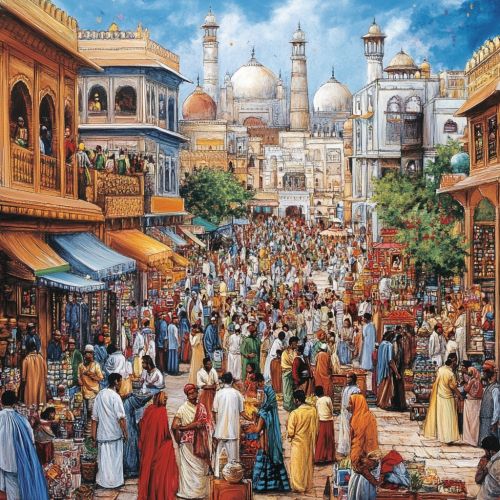Cosmopolitan: Difference between revisions
(Created page with "== Definition and Etymology == The term "cosmopolitan" is derived from the Greek words "kosmos" (world) and "polites" (citizen), thus translating to "citizen of the world." It encompasses a broad range of ideas and concepts, including cultural diversity, global citizenship, and the interconnectedness of human societies. The concept has evolved over time, reflecting changes in social, political, and economic landscapes. == Historical Context == === Ancient Roots === Th...") |
No edit summary |
||
| Line 27: | Line 27: | ||
The arts have long been a medium for expressing and exploring cosmopolitan ideas. From literature to visual arts, artists have used their work to comment on global issues and celebrate cultural diversity. The works of [[James Joyce]], [[Gabriel García Márquez]], and [[Chinua Achebe]] exemplify literary cosmopolitanism, while visual artists like [[Pablo Picasso]] and [[Yayoi Kusama]] incorporate diverse cultural influences into their art. | The arts have long been a medium for expressing and exploring cosmopolitan ideas. From literature to visual arts, artists have used their work to comment on global issues and celebrate cultural diversity. The works of [[James Joyce]], [[Gabriel García Márquez]], and [[Chinua Achebe]] exemplify literary cosmopolitanism, while visual artists like [[Pablo Picasso]] and [[Yayoi Kusama]] incorporate diverse cultural influences into their art. | ||
[[Image:Detail-97879.jpg|thumb|center|An image of a bustling, diverse cityscape with people from various cultural backgrounds interacting harmoniously.|class=only_on_mobile]] | |||
[[Image:Detail-97880.jpg|thumb|center|An image of a bustling, diverse cityscape with people from various cultural backgrounds interacting harmoniously.|class=only_on_desktop]] | |||
== Economic Cosmopolitanism == | == Economic Cosmopolitanism == | ||
Latest revision as of 14:57, 4 September 2024
Definition and Etymology
The term "cosmopolitan" is derived from the Greek words "kosmos" (world) and "polites" (citizen), thus translating to "citizen of the world." It encompasses a broad range of ideas and concepts, including cultural diversity, global citizenship, and the interconnectedness of human societies. The concept has evolved over time, reflecting changes in social, political, and economic landscapes.
Historical Context
Ancient Roots
The notion of cosmopolitanism can be traced back to ancient Greek philosophy, particularly the Cynics and the Stoics. Diogenes of Sinope, a prominent Cynic philosopher, is often credited with the earliest articulation of cosmopolitan ideals. He famously declared himself a "citizen of the world," rejecting the conventional divisions of city-states. The Stoics, including Zeno of Citium and Epictetus, further developed these ideas, advocating for a universal community bound by reason and virtue.
Enlightenment and Modernity
The Enlightenment era saw a resurgence of cosmopolitan thought, with philosophers like Immanuel Kant and Voltaire championing ideas of universal human rights and global justice. Kant's essay "Perpetual Peace" outlines a vision for a world governed by international laws and mutual respect among nations. This period also witnessed the rise of global trade and exploration, which facilitated cultural exchanges and the spread of cosmopolitan ideals.
Philosophical Dimensions
Ethical Cosmopolitanism
Ethical cosmopolitanism posits that individuals have moral obligations to all human beings, regardless of national or cultural affiliations. This perspective challenges the primacy of local or national loyalties, advocating for a global ethic based on shared humanity. Peter Singer, a contemporary philosopher, argues for an "expanding circle" of moral concern that includes all sentient beings.
Political Cosmopolitanism
Political cosmopolitanism envisions a world where global institutions and laws govern international relations, transcending the sovereignty of individual nation-states. Proponents like David Held and Thomas Pogge argue for the establishment of global governance structures to address issues such as human rights, environmental sustainability, and economic inequality. This approach often intersects with theories of globalization and transnationalism.
Cultural Cosmopolitanism
Multiculturalism and Hybridity
Cultural cosmopolitanism celebrates the diversity of human cultures and the blending of cultural practices. It emphasizes the value of cultural exchange and the creation of hybrid identities. Homi K. Bhabha, a key figure in postcolonial studies, explores the concept of "cultural hybridity," where new, syncretic cultures emerge from the interaction of different traditions.
Cosmopolitanism in the Arts
The arts have long been a medium for expressing and exploring cosmopolitan ideas. From literature to visual arts, artists have used their work to comment on global issues and celebrate cultural diversity. The works of James Joyce, Gabriel García Márquez, and Chinua Achebe exemplify literary cosmopolitanism, while visual artists like Pablo Picasso and Yayoi Kusama incorporate diverse cultural influences into their art.


Economic Cosmopolitanism
Global Trade and Commerce
Economic cosmopolitanism advocates for the free movement of goods, services, and people across borders. It is closely associated with the principles of free trade and economic liberalization. Economists like Adam Smith and David Ricardo laid the groundwork for these ideas, arguing that global trade leads to mutual benefits and economic growth.
Critiques and Challenges
Despite its advantages, economic cosmopolitanism faces significant critiques. Critics argue that it can exacerbate economic inequalities and undermine local economies. The anti-globalization movement highlights the negative impacts of global capitalism, such as exploitation, environmental degradation, and cultural homogenization. Scholars like Joseph Stiglitz and Amartya Sen advocate for more equitable and sustainable approaches to global economic integration.
Cosmopolitanism and Globalization
Interconnectedness and Mobility
The contemporary era of globalization has intensified the interconnectedness of human societies. Advances in technology, communication, and transportation have facilitated unprecedented levels of mobility and cultural exchange. This has led to the emergence of "global cities" like New York, London, and Tokyo, which serve as hubs of cosmopolitan activity.
Global Challenges
Globalization has also brought to the fore a range of transnational challenges that require cosmopolitan solutions. Issues such as climate change, pandemics, and international terrorism cannot be effectively addressed by individual nation-states alone. Cosmopolitanism advocates for collaborative, global approaches to these pressing problems.
Cosmopolitanism in Practice
Education and Advocacy
Educational institutions and non-governmental organizations (NGOs) play a crucial role in promoting cosmopolitan values. Programs that emphasize global citizenship, cultural exchange, and international cooperation help foster a cosmopolitan mindset. Organizations like Amnesty International and Doctors Without Borders exemplify cosmopolitan principles in their advocacy and humanitarian work.
Cosmopolitan Communities
Cosmopolitanism is not just an abstract ideal but is also manifested in real-world communities. Cities with diverse populations and vibrant cultural scenes often serve as microcosms of cosmopolitanism. These communities provide a space for intercultural dialogue, mutual learning, and the celebration of diversity.
